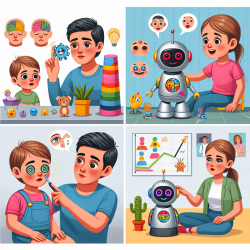As a therapist working in an educational setting, I’m always on the lookout for effective strategies to help my students thrive. Recently, I came across a fascinating study titled "Impact of an Interoception-Based Program on Emotion Regulation in Autistic Children" that sheds light on a promising approach for improving emotion regulation in autistic children. The study, conducted by Kelly Mahler and colleagues, offers valuable insights that can be applied in school settings to support our students better.
Understanding Interoception and Its Importance
Interoception refers to the ability to perceive the internal state of our body. This includes recognizing signals such as hunger, thirst, pain, and even emotions. For autistic individuals, interoceptive awareness is often impaired, which can significantly impact their ability to regulate emotions and participate in daily activities.
The Study: Key Findings
The research involved a 25-week school-based intervention using "The Interoception Curriculum: A Guide to Developing Mindful Self-Regulation." The study included 14 autistic students aged between 9 and 19 years. Using tools like the Behavior Rating Inventory of Executive Function 2 (BRIEF-2) and the Caregiver Questionnaire for Interoceptive Awareness-2nd Edition (CQIA-2), the researchers measured changes in interoceptive awareness and emotion regulation.
The results were promising, showing statistically significant improvements in both interoceptive awareness and emotion regulation among the participants. This suggests that the Interoception Curriculum is not only feasible in a school setting but also effective in helping autistic children manage their emotions better.
Implementing the Findings in Your Practice
Here are some practical steps you can take to incorporate these findings into your therapy sessions:
- Introduce Interoception Activities: Start with simple activities that help children notice and describe their internal body signals. For example, ask them to describe how their stomach feels when they are hungry or how their heart feels when they are excited.
- Use Visual Supports: Visual aids can help children better understand and communicate their interoceptive experiences. Create charts or cards with different body signals and corresponding emotions.
- Incorporate Mindful Practices: Mindfulness activities, such as deep breathing and body scans, can enhance interoceptive awareness. These practices can be adapted to suit the cognitive and attentional needs of each child.
- Collaborate with Educators: Work closely with teachers to integrate interoception-based activities into the classroom routine. This collaborative approach ensures consistency and reinforces the skills learned during therapy sessions.
Encouraging Further Research
While the findings of this study are encouraging, more research is needed to fully understand the potential of interoception-based interventions. I encourage fellow practitioners to explore this area further and consider conducting their own studies or pilot programs. Sharing your findings with the broader community can help us collectively improve our practices and support our students better.
To read the original research paper, please follow this link: Impact of an Interoception-Based Program on Emotion Regulation in Autistic Children.










